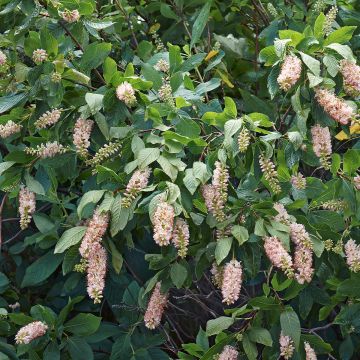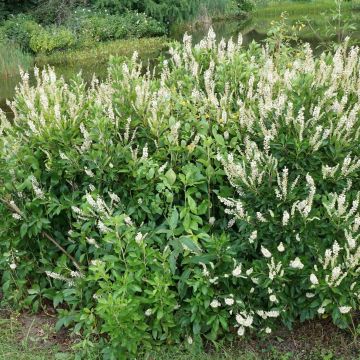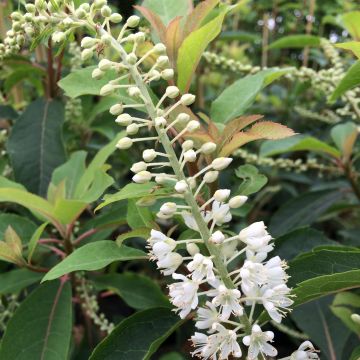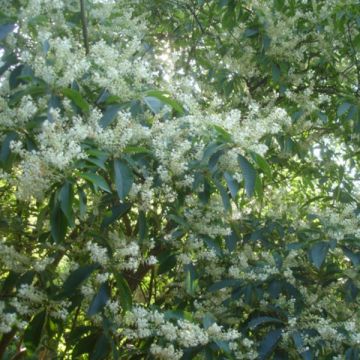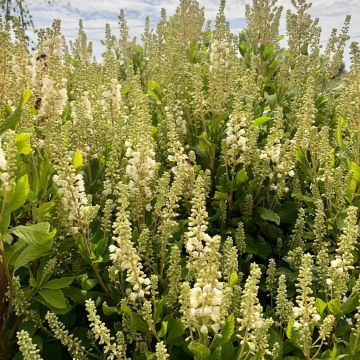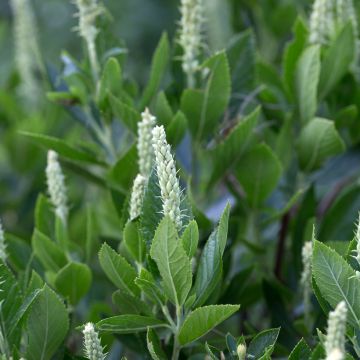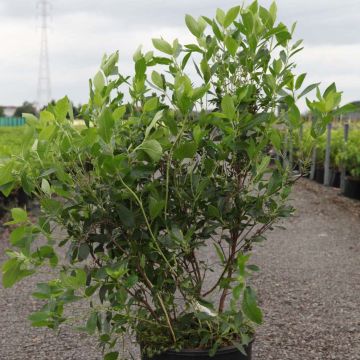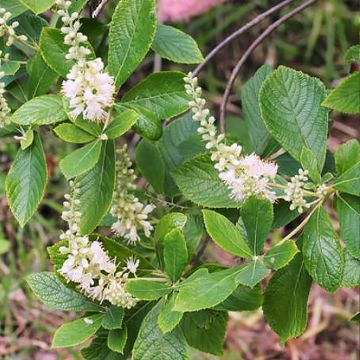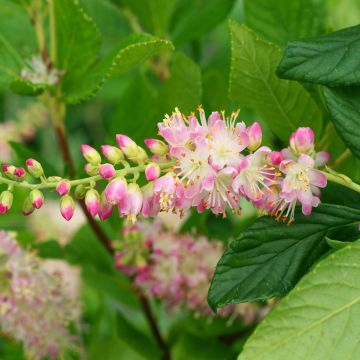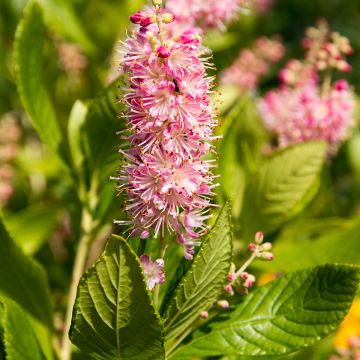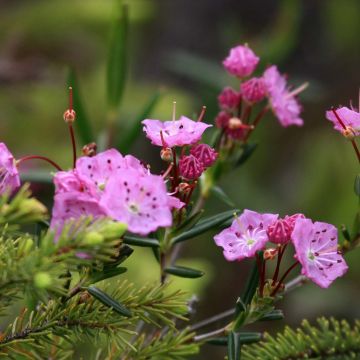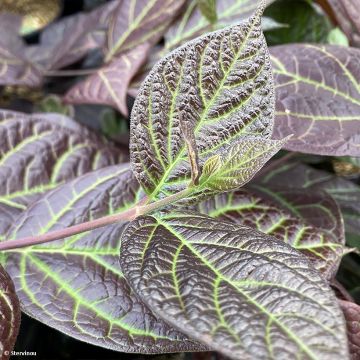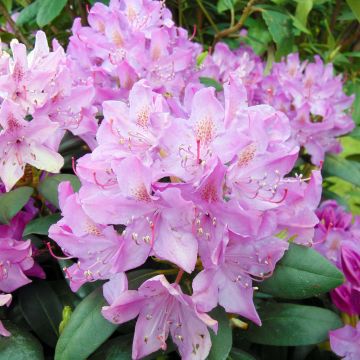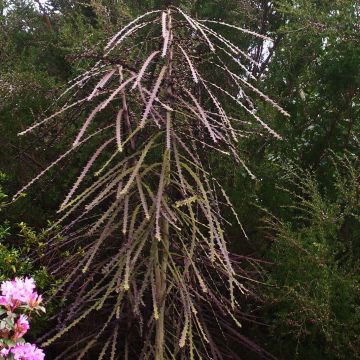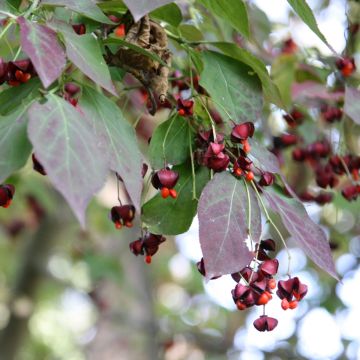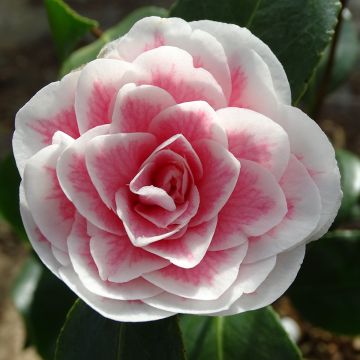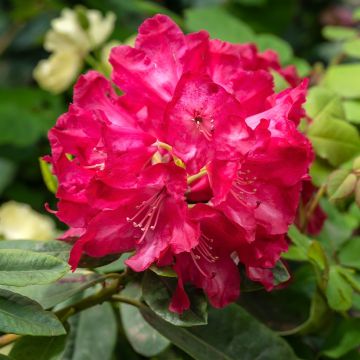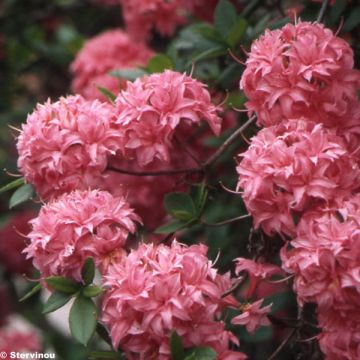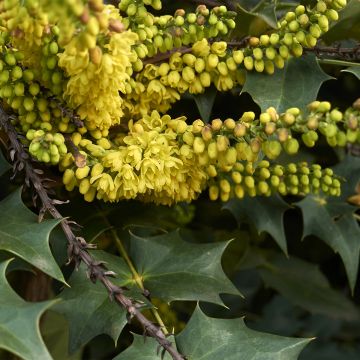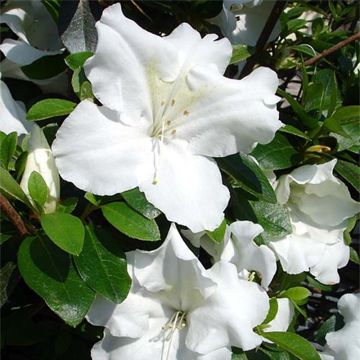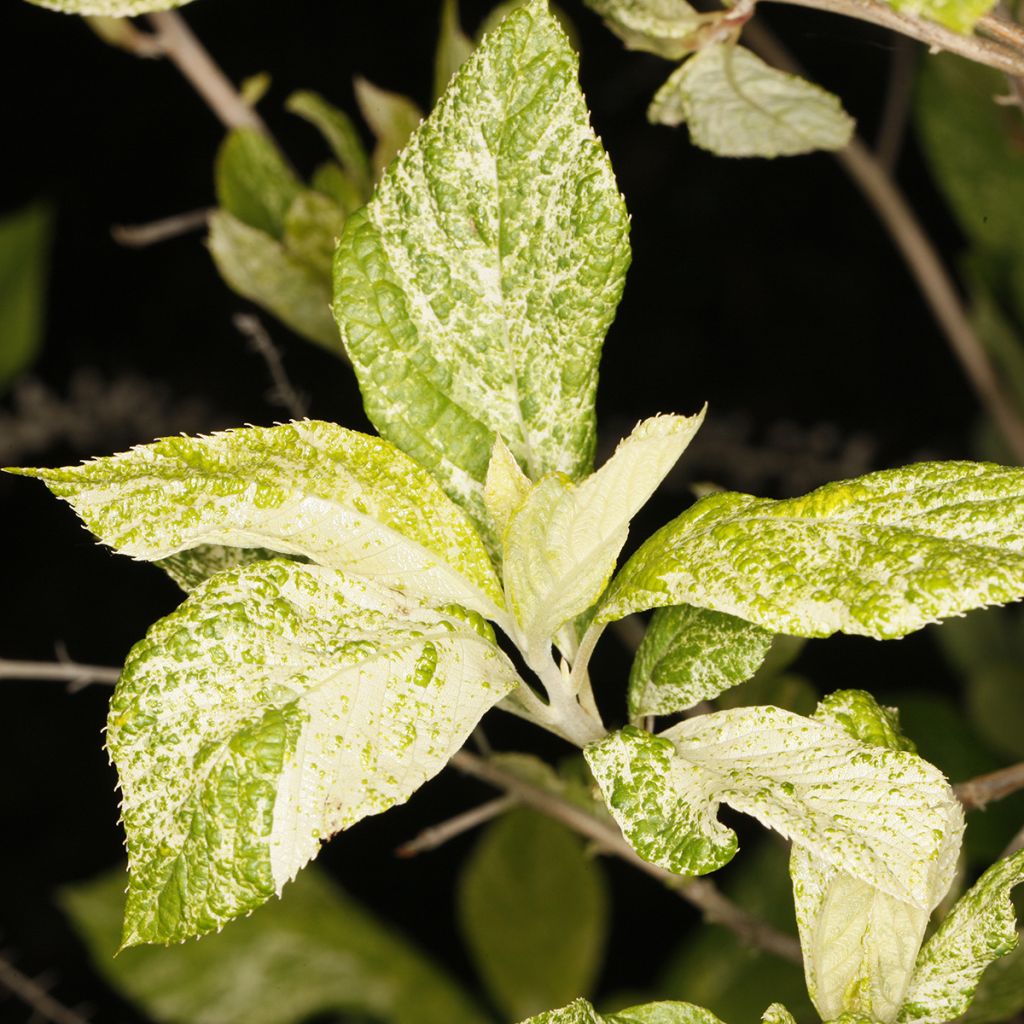

Clethra alnifolia Creels Calico - Sweet pepperbush
Clethra alnifolia Creels Calico - Sweet pepperbush
Clethra alnifolia Creels Calico
Coastal sweetpepperbush, Summer sweet
Why not try an alternative variety in stock?
View all →This plant carries a 24 months recovery warranty
More information
We guarantee the quality of our plants for a full growing cycle, and will replace at our expense any plant that fails to recover under normal climatic and planting conditions.
From €5.90 for pickup delivery and €6.90 for home delivery
Express home delivery from €8.90.
Does this plant fit my garden?
Set up your Plantfit profile →
Description
The Clethra alnifolia Creels Calico is a variety of Sweet Pepperbush that is very unique and highly desirable. Its green foliage speckled with white makes it highly ornamental throughout spring and summer, and in autumn, it takes on a golden hue that transforms its appearance. This bushy shrub, which may slightly sucker, also produces beautiful clusters of fragrant white flowers in late summer, a time when flowering shrubs are scarce. Clethra plants thrive in humus-bearing, non-calcareous, moist to wet soils. They enjoy the same conditions as heather plants and can be seamlessly integrated into heather beds to create beautiful combinations.
Clethra alnifolia is a deciduous shrub with semi-suckering roots, native to humid forests and marshy areas in the eastern United States. It can be found from southern Maine to eastern Texas. In the wild, it forms small thickets that can reach 3m in all directions. It is very hardy, tolerating temperatures as low as -20°C. It is one of only two genera in the relatively unknown Clethraceae family, which is named after it, the other being the tropical Purdiaea.
The 'Creels Calico' cultivar forms a relatively compact bush that does not exceed 1.50m in all directions. It has obovate, glabrous, toothed leaves that are 5-10cm long and alternate along flexible, green branches. The leaves are numerous and have short petioles, with new shoots appearing at their axils, especially in the upper part of the plant, giving it a very bushy appearance. The foliage is mottled with cream-white in an irregular pattern, varying from leaf to leaf. Some leaf blades remain predominantly green, while others are heavily splashed with white, and a few have a mix of entirely green and predominantly white areas. This random variegation gives this horticultural variety a bright and easily identifiable appearance. Like the botanical species, the foliage turns golden yellow with light brown spots in autumn, once again illuminating the garden.
In late July, clusters of 10-15cm long flower spikes appear, composed of several dozen small white flowers, reminiscent of those of certain Ericaceae, such as the Oxydendron arboreum. This is no coincidence, as Clethraceae are also part of the order Ericales... Emitting a sweet fragrance, these bell-shaped flowers, with their unfused petals, are appreciated by bees and pollinators. The flowers are followed by small round fruits, arranged in slender clusters, which remain decorative on the branches throughout winter if they are not eaten by birds. These fruits, which somewhat resemble peppercorns, have earned this shrub the name 'sweet pepperbush' in the United States.
This shrub is hardy to approximately -20°C and thrives in cool climates when exposed to full sun, while it prefers partial shade elsewhere, as it does not tolerate dryness, either atmospheric or in the soil. It requires a neutral to acidic, humus-rich, light soil that does not dry out.
The Clethra alnifolia Creels Calico is ideal for brightening up a shaded area in the garden. It pairs perfectly with heather plants, sharing their requirements. You can also combine it with numerous Rhododendrons, whose spring blooms will allow you to enjoy flowers for a longer period of time. The Mountain Laurel, or Kalmia, which is unjustly underplanted, will provide beautiful campanulate flower clusters in May and June. The Hydrangeas, with their variety of inflorescence shapes, such as panicles, flat or round heads, and diverse colours, will accompany and even extend the flowering season of the Clethra. To brighten up the end of the year, succumb to the charm of the Camellia sasanqua Yuletide, an autumn Camellia with magnificent red flowers and yellow centres. And to start the winter beautifully and enjoy flowers all year round, plant a Hamamelis intermedia Arnold Promise, or Witch Hazel, in the background. Its bright yellow filaments will bring joy to your flower bed during the dark days of January and February.
Report an error about the product description
Plant habit
Flowering
Foliage
Botanical data
Clethra
alnifolia
Creels Calico
Clethraceae
Coastal sweetpepperbush, Summer sweet
Cultivar or hybrid
Other Clethra
Planting and care
The Clethra alnifolia Creels Calico, hardy down to a minimum of -20°C, is preferably planted in spring, after the last frosts, or in autumn in mild climates. It requires a soil that remains moist throughout the year, light, well-drained, and acidic to neutral. It can tolerate sun in not too hot climates, otherwise it will prefer a semi-shaded position. Soak the root ball in a bucket of water for fifteen minutes before planting to ensure proper hydration (preferably use rainwater). Dig a hole 50 cm wide and deep and enrich it with acidic planting compost, or even heath soil that you will mix with the existing soil. Avoid peat, as it tends to be too drying. Position the root ball, backfill around it, and water abundantly. This bush cannot tolerate limestone or drought, so make regular waterings if necessary to prevent the soil from drying out. Remove faded flowers and, in winter, prune old stems. You can also prune it back in spring to 30 or 40 cm around March to maintain a compact and bushy habit, as it tends to branch out a little in height. If necessary, remove any suckers that have formed, but you can also leave them if you have some space, as it is not really invasive. It is naturally resistant to diseases and parasites.
Planting period
Intended location
Care
This item has not been reviewed yet - be the first to leave a review about it.
Shrubs for semi-shade
Haven't found what you were looking for?
Hardiness is the lowest winter temperature a plant can endure without suffering serious damage or even dying. However, hardiness is affected by location (a sheltered area, such as a patio), protection (winter cover) and soil type (hardiness is improved by well-drained soil).

Photo Sharing Terms & Conditions
In order to encourage gardeners to interact and share their experiences, Promesse de fleurs offers various media enabling content to be uploaded onto its Site - in particular via the ‘Photo sharing’ module.
The User agrees to refrain from:
- Posting any content that is illegal, prejudicial, insulting, racist, inciteful to hatred, revisionist, contrary to public decency, that infringes on privacy or on the privacy rights of third parties, in particular the publicity rights of persons and goods, intellectual property rights, or the right to privacy.
- Submitting content on behalf of a third party;
- Impersonate the identity of a third party and/or publish any personal information about a third party;
In general, the User undertakes to refrain from any unethical behaviour.
All Content (in particular text, comments, files, images, photos, videos, creative works, etc.), which may be subject to property or intellectual property rights, image or other private rights, shall remain the property of the User, subject to the limited rights granted by the terms of the licence granted by Promesse de fleurs as stated below. Users are at liberty to publish or not to publish such Content on the Site, notably via the ‘Photo Sharing’ facility, and accept that this Content shall be made public and freely accessible, notably on the Internet.
Users further acknowledge, undertake to have ,and guarantee that they hold all necessary rights and permissions to publish such material on the Site, in particular with regard to the legislation in force pertaining to any privacy, property, intellectual property, image, or contractual rights, or rights of any other nature. By publishing such Content on the Site, Users acknowledge accepting full liability as publishers of the Content within the meaning of the law, and grant Promesse de fleurs, free of charge, an inclusive, worldwide licence for the said Content for the entire duration of its publication, including all reproduction, representation, up/downloading, displaying, performing, transmission, and storage rights.
Users also grant permission for their name to be linked to the Content and accept that this link may not always be made available.
By engaging in posting material, Users consent to their Content becoming automatically accessible on the Internet, in particular on other sites and/or blogs and/or web pages of the Promesse de fleurs site, including in particular social pages and the Promesse de fleurs catalogue.
Users may secure the removal of entrusted content free of charge by issuing a simple request via our contact form.
The flowering period indicated on our website applies to countries and regions located in USDA zone 8 (France, the United Kingdom, Ireland, the Netherlands, etc.)
It will vary according to where you live:
- In zones 9 to 10 (Italy, Spain, Greece, etc.), flowering will occur about 2 to 4 weeks earlier.
- In zones 6 to 7 (Germany, Poland, Slovenia, and lower mountainous regions), flowering will be delayed by 2 to 3 weeks.
- In zone 5 (Central Europe, Scandinavia), blooming will be delayed by 3 to 5 weeks.
In temperate climates, pruning of spring-flowering shrubs (forsythia, spireas, etc.) should be done just after flowering.
Pruning of summer-flowering shrubs (Indian Lilac, Perovskia, etc.) can be done in winter or spring.
In cold regions as well as with frost-sensitive plants, avoid pruning too early when severe frosts may still occur.
The planting period indicated on our website applies to countries and regions located in USDA zone 8 (France, United Kingdom, Ireland, Netherlands).
It will vary according to where you live:
- In Mediterranean zones (Marseille, Madrid, Milan, etc.), autumn and winter are the best planting periods.
- In continental zones (Strasbourg, Munich, Vienna, etc.), delay planting by 2 to 3 weeks in spring and bring it forward by 2 to 4 weeks in autumn.
- In mountainous regions (the Alps, Pyrenees, Carpathians, etc.), it is best to plant in late spring (May-June) or late summer (August-September).
The harvesting period indicated on our website applies to countries and regions in USDA zone 8 (France, England, Ireland, the Netherlands).
In colder areas (Scandinavia, Poland, Austria...) fruit and vegetable harvests are likely to be delayed by 3-4 weeks.
In warmer areas (Italy, Spain, Greece, etc.), harvesting will probably take place earlier, depending on weather conditions.
The sowing periods indicated on our website apply to countries and regions within USDA Zone 8 (France, UK, Ireland, Netherlands).
In colder areas (Scandinavia, Poland, Austria...), delay any outdoor sowing by 3-4 weeks, or sow under glass.
In warmer climes (Italy, Spain, Greece, etc.), bring outdoor sowing forward by a few weeks.

































